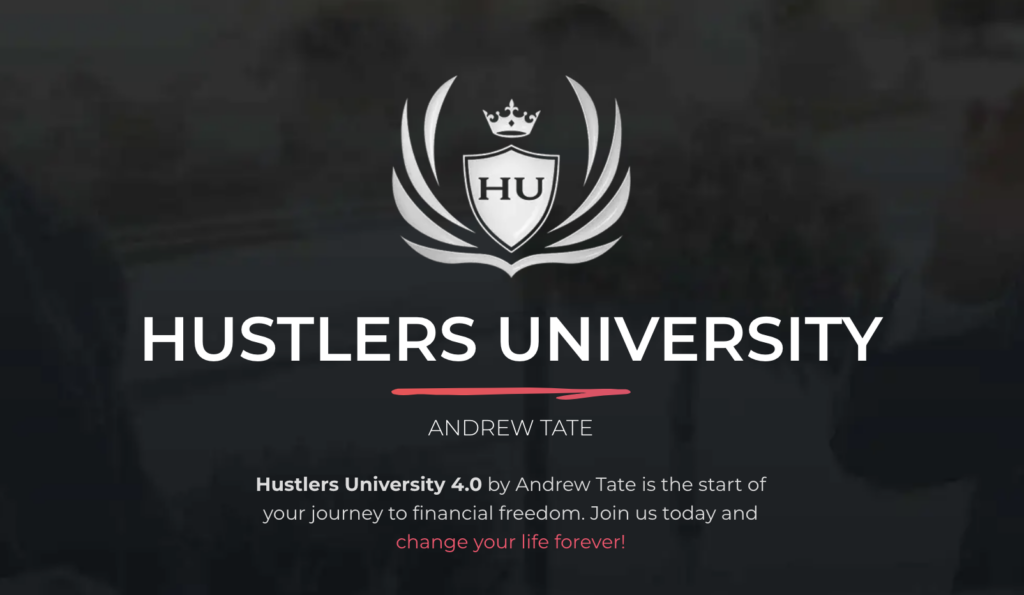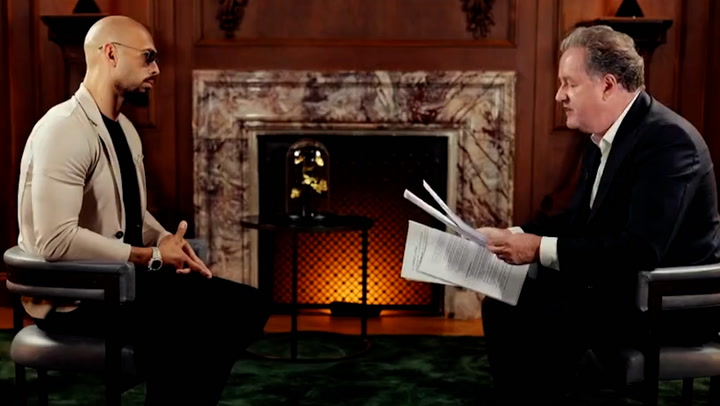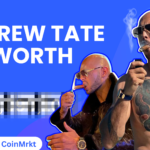Andrew Tate, born Emory Andrew Tate III on December 1, 1986, in Washington, D.C., is a British-American social media personality, businessman, and former professional kickboxer. Tate’s upbringing was marked by a diverse and multicultural background. His father, Emory Tate, was an African American international chess master, while his mother, Eileen Tate, is of English descent. Growing up in Chicago and Goshen, Indiana, Tate moved to England with his mother and siblings after his parents’ divorce.
Tate was educated at Halyard High School and Luton Sixth Form College in England. His early life was not without challenges, but these experiences helped shape his resilient and competitive nature. He began training in boxing and martial arts at a young age, which laid the foundation for his kickboxing career (Wikipedia) (Wealthypipo).
Brief Introduction:
| Full Name | Emory Andrew Tate III |
| Net Worth | $12.3 million |
| Date of Birth | December 1, 1986 |
| Place of Birth | Washington, D.C., United States |
| Occupation | Media personality |
| Nationality | American-British |
Early Life and Career Beginnings
Andrew Tate was born in Washington, D.C., and spent his early years in both the United States and the United Kingdom. With a strong family background in sports—his father, Emory Tate, was an International Master in chess—Andrew developed a competitive spirit early on. This drive led him to pursue kickboxing, where he achieved significant success, winning multiple world championships. His prowess in the ring laid the foundation for his later ventures, providing him with the discipline and public recognition that would fuel his entrepreneurial ambitions.
Transition to Entrepreneurship
After achieving considerable success in kickboxing, Andrew Tate began to transition into the world of entrepreneurship. This shift marked the beginning of his journey to becoming a multi-millionaire, utilizing his public persona and skills to build a diverse portfolio of business ventures.

Establishing Business Ventures
One of Tate’s early forays into business was through his webcam business. Leveraging the online platform, he recruited and trained webcam models, creating a significant income stream. This venture not only showcased his ability to capitalize on emerging online trends but also demonstrated his knack for managing and scaling a business.
Online Courses and Hustler’s University
Capitalizing on his success, Tate launched “Hustler’s University,” an online educational platform aimed at teaching people how to make money online. The courses cover various topics, including cryptocurrency, freelancing, and e-commerce, reflecting Tate’s diverse interests and expertise. His charismatic and often controversial marketing style helped attract a substantial number of subscribers, further boosting his income.

Social Media Influence
Andrew Tate’s presence on social media platforms like YouTube, Instagram, and Twitter has been pivotal in building his brand and expanding his reach. With millions of followers, his content, which ranges from motivational speeches to lifestyle tips, resonates with a broad audience. His strong opinions and unfiltered commentary often stir up discussions, keeping him relevant and continuously growing his follower base. This social media influence translates into significant earnings through ad revenue, sponsored posts, and brand collaborations.
Investments in Cryptocurrency
Tate’s entrepreneurial spirit also extends to the world of cryptocurrencies. He has been vocal about his investments in Bitcoin and other digital currencies, leveraging the volatile yet lucrative market to grow his wealth. His knowledge and insights into the crypto world are also shared through his online courses, adding another dimension to his income sources.
Further read: Andrew Tate’s DADDY Meme Coin Apparently Sitting on $45M
Real Estate Holdings
In addition to his digital ventures, Andrew Tate has invested in real estate. His properties span various locations, providing him with a steady stream of passive income. Real estate investments are a testament to his strategic thinking and long-term financial planning, ensuring a diversified and stable financial portfolio.

Controversial Marketing Tactics
Tate’s marketing tactics, often described as controversial, play a crucial role in his entrepreneurial success. His bold statements and unorthodox viewpoints generate substantial media attention, driving traffic to his businesses. While these tactics polarize public opinion, they undeniably contribute to his visibility and profitability.
Adaptation and Resilience
Throughout his entrepreneurial journey, Andrew Tate has shown remarkable adaptation and resilience. He has successfully navigated various industries, from adult entertainment to education and finance, demonstrating a keen ability to identify and exploit profitable opportunities. His journey reflects a blend of strategic thinking, bold decision-making, and relentless ambition.
Breakdown of Andrew Tate’s Net Worth
| Financial Information | Amount |
| Net Worth | $710 Million |
| Annual Income | $70 Million |
| Crypto Investments | $150 Million |
| Stock Portfolio | $200 Million |
| Real Estate Assets | $73 Million |
| Bank Savings | $20 Million |
| Art Collection | $30 Million |
| Jewelry and Watches | $10 Million |
| Business Investments | $100 Million |
| Charitable Donations | $5 Million annually |
Further read: Tristan Tate Net Worth
Comparison with Other Influencers
Andrew Tate’s financial success and public persona invite inevitable comparisons with other prominent influencers. His journey from a kickboxing champion to a multifaceted entrepreneur showcases unique aspects that set him apart, yet aligns with the broader patterns observed among top influencers.

Income Diversity
A hallmark of Andrew Tate’s financial strategy is his diverse income streams. Unlike some influencers who rely primarily on one platform or venture, Tate has built a varied portfolio. This approach is similar to other successful influencers like Logan Paul and Gary Vaynerchuk, who also diversify their income through multiple channels. Logan Paul, for instance, combines revenue from YouTube, boxing matches, and merchandise sales. Gary Vaynerchuk leverages his social media presence, public speaking, and business ventures. This diversity not only stabilizes their income but also maximizes their earning potential across different markets.
Social Media Influence
Andrew Tate’s influence on social media is a critical component of his success. With millions of followers, he effectively monetizes his content through ad revenue, sponsored posts, and direct engagement with his audience. This mirrors the strategies of influencers like Kim Kardashian and PewDiePie, who also capitalize on their vast followings. Kim Kardashian’s brand collaborations and product lines, combined with her reality TV earnings, highlight the power of social media influence in building substantial wealth. Similarly, PewDiePie’s dominance on YouTube and associated merchandise sales underscore the financial benefits of a strong online presence.
Controversial Persona
Tate’s controversial statements and bold marketing tactics are integral to his brand. This strategy, while polarizing, ensures continuous media attention and public interest. Other influencers, such as Jake Paul and Dan Bilzerian, employ similar tactics. Jake Paul’s career is marked by high-profile stunts and controversies, which, despite criticism, keep him in the public eye and drive traffic to his content. Dan Bilzerian’s extravagant lifestyle and contentious behavior similarly fuel his brand’s appeal and financial success. This approach highlights the delicate balance between controversy and popularity in maintaining a lucrative influencer career.
Entrepreneurial Ventures
Tate’s entrepreneurial spirit, reflected in ventures like Hustler’s University and his webcam business, aligns with the business acumen of influencers like Kylie Jenner and Jeffree Star. Kylie Jenner’s success with Kylie Cosmetics and Jeffree Star’s cosmetics brand showcase how influencers can leverage their fame to build profitable businesses. These ventures often surpass the earnings from their original platforms, demonstrating the potential for influencers to expand their income through strategic entrepreneurship.
Cryptocurrency Investments
Tate’s involvement in cryptocurrency investments sets him apart from many traditional influencers. His engagement with digital currencies reflects a forward-thinking approach and willingness to engage with emerging markets. This investment strategy is shared by influencers like Elon Musk, whose tweets about cryptocurrencies significantly impact market trends. Musk’s involvement highlights how influencers can influence and benefit from the volatile world of digital currencies. Tate’s success in this domain emphasizes the growing intersection between social influence and financial markets.
Real Estate Investments
Real estate is another area where Andrew Tate aligns with successful influencers. His investments in properties provide a stable and long-term income stream, similar to strategies employed by influencers like Graham Stephan. Stephan, a real estate investor and YouTuber, emphasizes the importance of real estate in building and maintaining wealth. This strategy offers stability and growth potential, contrasting with the more volatile earnings from social media and online ventures.
Controversies and Public Image
Andrew Tate’s journey to fame and wealth is as marked by controversy as it is by success. His public image, shaped by bold statements and contentious behavior, has significantly influenced his career, both positively and negatively.

Bold and Unfiltered Opinions
Andrew Tate is known for his unfiltered opinions on various topics, from gender roles to financial advice. His outspoken nature often sparks intense debates online, drawing both fervent supporters and harsh critics. This polarizing approach, while controversial, keeps him in the public eye and contributes to his online engagement. Tate’s willingness to voice unpopular opinions resonates with a segment of his audience that values authenticity and boldness, helping to build a loyal following.
Legal Issues and Public Scrutiny
Tate’s career has not been without legal troubles. His webcam business, in particular, has faced scrutiny and criticism. Allegations of unethical practices have surfaced, casting a shadow over his entrepreneurial ventures. These legal issues, while damaging to his reputation, also add to his notoriety. The public scrutiny surrounding his business practices highlights the risks and ethical concerns associated with some of his ventures, raising questions about the balance between profit and morality.
Media Portrayal
The media plays a significant role in shaping Andrew Tate’s public image. Mainstream media often portrays him as a controversial and divisive figure, focusing on his more inflammatory statements and actions. This portrayal reinforces his image as a provocateur and fuels the public’s fascination with his persona. However, it also attracts negative attention and criticism, impacting his reputation among more conservative audiences.
Impact on Business Ventures
Controversies surrounding Tate have both helped and hindered his business ventures. On the one hand, the attention generated by his bold persona drives traffic to his platforms and businesses. For instance, the notoriety surrounding Hustler’s University and his online courses draws in curious subscribers eager to learn from a self-made millionaire. On the other hand, the negative publicity can deter potential business partners and investors wary of associating with a polarizing figure.
Social Media Bans and Platform Struggles
Andrew Tate has faced bans and restrictions on various social media platforms due to his controversial content. These bans pose significant challenges, limiting his reach and ability to monetize his online presence. However, they also contribute to his image as a rebellious figure fighting against censorship, which can galvanize his supporters and enhance his appeal among those who value free speech and anti-establishment sentiments.
Public Perception and Influence
Despite the controversies, Tate’s influence remains substantial. His teachings and lifestyle resonate with individuals seeking financial independence and a bold approach to life. His success story serves as a powerful narrative for those inspired by his rise from a professional athlete to a multi-millionaire entrepreneur. This influence extends beyond his direct followers, impacting broader discussions on entrepreneurship, masculinity, and personal development.
FAQs
1. Who is Andrew Tate?
Andrew Tate is a former kickboxing champion turned entrepreneur and social media influencer known for his controversial opinions and diverse business ventures.
2. How did Andrew Tate transition from kickboxing to entrepreneurship?
After a successful kickboxing career, Tate leveraged his fame and strategic thinking to start ventures like a webcam business, online courses, and real estate investments.
3. What is Hustler’s University?
Hustler’s University is an online educational platform founded by Tate, offering courses on making money online, cryptocurrency investments, and entrepreneurial skills.
4. How does Andrew Tate make money from social media?
Tate earns through ad revenue, sponsored posts, and brand collaborations on platforms like YouTube, Instagram, and Twitter, where he has millions of followers.
5. What are some of Andrew Tate’s most successful business ventures?
Tate’s notable ventures include his webcam business, Hustler’s University, real estate investments, and cryptocurrency trading.
6. How has controversy impacted Andrew Tate’s career?
Controversies have both fueled Tate’s fame and attracted criticism. His bold statements generate media attention, but also result in social media bans and public scrutiny.
7. How does Andrew Tate compare to other influencers?
Tate’s diverse income streams, controversial persona, and entrepreneurial ventures align him with influencers like Logan Paul, Kim Kardashian, and Gary Vaynerchuk, who also diversify their earnings.
8. What role do cryptocurrency investments play in Tate’s wealth?
Cryptocurrency investments are a significant part of Tate’s portfolio, contributing to his net worth through strategic trading and market leverage.
9. How has Andrew Tate’s real estate investment strategy contributed to his net worth?
Tate’s real estate investments provide a stable income stream and long-term financial security, complementing his other, more volatile income sources.
10. What are the main sources of Andrew Tate’s net worth?
Tate’s net worth is built from diverse sources, including social media revenue, online courses, his webcam business, cryptocurrency investments, and real estate holdings.
11. What is Andrew Tate’s net worth?
As of 2024, Andrew Tate’s net worth is estimated to be around $350 million, stemming from his various business ventures and investments.
12. What are some of Andrew Tate’s most expensive assets?
Tate’s most expensive assets include luxury properties, high-end sports cars, and significant cryptocurrency holdings.
13. How many cars does Andrew Tate own?
Andrew Tate owns an impressive collection of luxury cars, including models from brands like Bugatti, Ferrari, and Lamborghini, totaling around 33 cars.
14. What is Andrew Tate’s Hustler’s University?
Hustler’s University is an online platform created by Tate, offering courses on financial independence, entrepreneurship, and investing, with a substantial subscriber base paying monthly fees.






